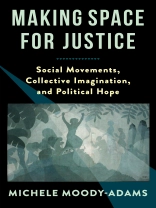Longlist, 2023 Edwards Book Award, Rodel Institute
From nineteenth-century abolitionism to Black Lives Matter today, progressive social movements have been at the forefront of social change. Yet it is seldom recognized that such movements have not only engaged in political action but also posed crucial philosophical questions about the meaning of justice and about how the demands of justice can be met.
Michele Moody-Adams argues that anyone who is concerned with the theory or the practice of justice—or both—must ask what can be learned from social movements. Drawing on a range of compelling examples, she explores what they have shown about the nature of justice as well as what it takes to create space for justice in the world. Moody-Adams considers progressive social movements as wellsprings of moral inquiry and as agents of social change, drawing out key philosophical and practical principles. Social justice demands humane regard for others, combining compassionate concern and robust respect. Successful movements have drawn on the transformative power of imagination, strengthening the motivation to pursue justice and to create the political institutions and social policies that can sustain it by inspiring political hope.
Making Space for Justice contends that the insights arising from social movements are critical to bridging the gap between discerning theory and effective practice—and should be transformative for political thought as well as for political activism.
Daftar Isi
Acknowledgments
Introduction
Part I: Understanding Social Movements
1. What is A Social Movement?
2. Social Movements and the Task of Democracy
3. Social Movements and the Moral Life
Part II: Social Movements and The Power of Collective Imagination
4. Taking Imagination Seriously
5. Language Matters
6. Justice and the Narrative Imagination
Part III: Social Movements and Political Hope
7. The Empire of Affect and The Challenge of Collective Hope
8. Hope and History
Notes
Bibliography
Index
Tentang Penulis
Michele Moody-Adams is Joseph Straus Professor of Political Philosophy and Legal Theory at Columbia University. She is the author of
Fieldwork in Familiar Places: Morality, Culture, and Philosophy (1997). Moody-Adams is a lifetime honorary fellow of Somerville College, Oxford, and a fellow of the American Academy of Arts and Sciences.












